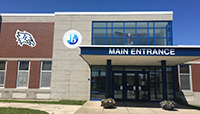7522 - Allergies and Anaphylaxis
| Policy: Allergies and Anaphylaxis | Policy Number: 7522 |
| Date of Original Policy: 08/15/2012 | Date Revision Adopted: 10/14/2020 |
| Reviewed by Policy Committee: 09/16/2020 | Date of Next Review: 04/22/2023 |
| Replacement of Policy Number: |
The Jordan-Elbridge School District is committed to providing a safe environment for students. The JECSD Board of Education understands the increasing prevalence of life threatening allergies among school populations. Recognizing that the risk of accidental exposure to food allergens can be reduced in the school setting, JECSD is committed to working in cooperation with parents, students, and physicians, to minimize risks and provide a safe educational environment for all students. The focus of food allergy management shall be on prevention, education, awareness, communication and emergency response. While it is unrealistic to guarantee an allergen-free environment, this policy aims to minimize the risk by implementing procedures to prepare for and reduce the amount of life-threatening allergic reactions in our schools.
Under the Allergy and Anaphylaxis Management Act of 2007 (NY Public Health Law Section 2500-h) the Commissioner of the New York Statement Department of Health and the Commissioner of the New York State Education Department developed procedures and guidelines to address anaphylaxis, which refers to a collection of symptoms affecting multiple systems in the body caused by a life-threatening allergic reaction, the most dangerous of which are breathing difficulties and a drop in blood pressure. After consideration of these guidance documents, the District has implemented this policy which will address:
• Information collection, procedures and forms
• Responsibilities of parents/guardians, students, school administrators, school nurses, teachers, food service
department, custodians, and transportation department, and other school employees
• School procedures for safeguarding allergic students
• Education and training
AMPLIFYING INSTRUCTIONS AND GUIDELINES:
The responsibility for developing and revising these procedures for implementing this policy shall reside with the Superintendent of Schools and/or his/her designee.
DELEGATION OF AUTHORITY:
The Superintendent, or his/her designee, has the responsibility for enforcing this Policy by communicating it to all relevant parties and by providing necessary instruction and guidelines to the appropriate administrators.
REPORTS:
All necessary and/or required forms developed to implement this policy will be completed and forwarded to the appropriate administrators and school nurses. All forms will be available on the district webpage.
RESPONSIBILITIES OF THE PARENT/GUARDIAN OF A STUDENT WITH ALLERGIES
Each parent/guardian of a child with an allergy shall have the following expectations:
1. Teach your child to:
a. Recognize the first symptoms of an allergic reaction.
b. Communicate with school staff as soon as he/she feels a reaction is starting.
c. Carry his/her own epinephrine auto-injector when appropriate.
d. Consistently wear the medical alert bracelet if applicable.
e. Do not trade, exchange or share snacks, lunches, drinks or utensils.
f. Understand the importance of hand washing before and after eating.
g. Report teasing and/or bullying that may relate to the child’s allergy.
b. Communicate with school staff as soon as he/she feels a reaction is starting.
c. Carry his/her own epinephrine auto-injector when appropriate.
d. Consistently wear the medical alert bracelet if applicable.
e. Do not trade, exchange or share snacks, lunches, drinks or utensils.
f. Understand the importance of hand washing before and after eating.
g. Report teasing and/or bullying that may relate to the child’s allergy.
2. Teach your child to take responsibility for his/her own safety. As children get older, teach them to:
a. Encourage self-advocacy of the seriousness of the allergy to adults and peers.
b. Communicate symptoms as soon as they appear to the school nurse and teacher.
c. Encourage education on label reading and ingredient safety.
d. Administer his/her own epinephrine auto-injector.
e. Develop awareness of their environments
b. Communicate symptoms as soon as they appear to the school nurse and teacher.
c. Encourage education on label reading and ingredient safety.
d. Administer his/her own epinephrine auto-injector.
e. Develop awareness of their environments
3. Inform the school nurse of your child’s allergies and health history prior to the opening of school (or as soon as
possible after diagnosis). All food allergies must be verified by documentation from physician or physician’s designated licensed extender Nurse Practitioner (NP) or Physician Assistant (PA), Doctor of Osteopathy (DO)], Advanced Practice Provider (APP).
4. Complete and submit all required medical documentation, instructions, and medications as directed by a physician
using the Allergy Action Plan and Food Allergy Awareness forms. Include an updated photo of your child on the forms.
5. Provide the school with current cell phone, pager, etc., maintain updated emergency contact numbers and medical
information.
6. Provide the school nurse with up-to-date emergency medications (including Epinephrine) so they can be placed in all
required locations for the current school year. Medications must comply with the district medication policy of proper
labeling and expiration. Replace medications after use or upon expiration.
7. Work with the school team collaboratively to develop the Individual Health Plan that accommodates your child’s
needs in the classroom, in the cafeteria, in after-care programs, during school-sponsored activities, and provide an
Allergy Action Plan.
8. The Individual Health Plan should also promote increasing age-appropriate independence as the student grows and matures. In determining age-appropriate independence the student’s level of autonomy and their ability to function autonomously is considered. A self-directed student must be able to:
• Identify medication (color, shape)
• Identify the purpose
• Determine correct dosage (e.g. 1 pill)
• Identify the time medication is to be taken
• Describe what would happen if medication was not taken
• Refuse to take medication if the student has any concerns, re: its inappropriateness
• Identify the purpose
• Determine correct dosage (e.g. 1 pill)
• Identify the time medication is to be taken
• Describe what would happen if medication was not taken
• Refuse to take medication if the student has any concerns, re: its inappropriateness
9. Consider providing a medical alert bracelet and/or necklace for your child.
10. Complete appropriate forms requested by Transportation or other appropriate departments and/or programs.
11. If your child is attending a school activity and/or participating in an extracurricular activity, provide appropriate medications (Benadryl, Epi-Pen) and a copy of your child’s Allergy Action Plan to district personnel in charge.
12. For students who require an alternative menu under their 504 Plan or IEP, submit a physician’s note indicating dietary restrictions to Food Service. The parent must review the menu with the child.
13. Provide “safe snacks” for your student’s classroom so there is always something your child can choose from during an unplanned special event.
14. Encourage your child to wash hands before and after handling food.
15. Inform the school of any changes in the child’s allergy status and complete a Food Allergy Change of Status Form which includes a physician’s statement.
RESPONSIBILITIES AND/OR EXPECTATIONS OF STUDENT
Each student with a Life-Threatening Allergy shall be expected to:
1. Develop a relationship with the school nurse to assist in identifying issues related to the management of the allergy in
the school.
2. Use proper hand washing before and after eating and throughout the school day.
3. Avoid sharing or trading of foods or eating utensils with others. Take responsibility for avoiding food allergens.
4. Not eat anything with unknown ingredients or known to contain any allergen.
5. Avoid putting anything in mouth such as writing utensils, fingers, or other foreign object.
6. Be proactive in the care and management of their allergies and reactions based on their developmental level. Learn to recognize personal symptoms of an allergic reaction.
7. Notify an adult immediately if they eat something they believe may contain the food to which they are allergic.
8. Notify an adult if they are being picked on or threatened by other students as it relates to their food allergy.
9. Keep emergency epinephrine with the student, in the nurse’s office, in the classroom or in coaches’ first aid box if deemed necessary. When appropriate, students are encouraged to carry their Epi-pen in accordance with school policy and guidelines. If the student is authorized to carry the emergency medication with them at all times, he/she will demonstrate responsibility of this practice by completing the skills checklist with the school nurse (found in the appendix within the Epinephrine Self-Administration Authorization packet for Anaphylaxis).
10. Develop an awareness of their environment.
11. Know the overall Individual Healthcare Plan and understand the responsibilities of the plan.
12. Develop greater independence to keep themselves safe from anaphylactic reactions.
RESPONSIBILITIES OF SCHOOL ADMINISTRATORS
1. Follow all applicable federal laws, including ADA, Section 504, and FERPA, as well as all state laws and district policies/guidelines that may apply.
2. Have available the appropriate allergy forms for the parent and explain that the required forms must be returned in a timely fashion to ensure a safe environment.
3. Provide appropriate staff with opportunities for volunteer in-service training and education on reducing allergy risks,identifying allergy symptoms, implementing emergency procedures and administering epinephrine.
4. Ensure the Individual Health Plan for Accommodations is available in the nurse’s office and in a student’s homeroom at the elementary levels.
5. Instruct and reinforce with custodial personnel the development of cleaning protocol to ensure that the threat of allergens is minimized.
6. Direct school staff to discuss students’ health issues in confidential settings and be mindful not to isolate the allergic student or label them in front of others.
RESPONSIBILITIES OF SCHOOL NURSES
The school nurse is the primary coordinator of each student’s life-threatening allergy plan. Each school nurse will have the following responsibilities:
1. Follow all applicable federal laws, including ADA, Section 504, and FERPA, as well as all state laws and district policies/guidelines that may apply.
2. The HIPAA Compliant Authorization for Exchange of Health & Education Information will be presented to parents for signature to provide needed communication between the supervising physician and school for effective implementation of the plan.
3. Maintain updated AAP/Individual Health Plan for Accommodations in the nurse’s office, in the classroom when appropriate, and with Epinephrine that is carried by identified students. The emergency action plans will also travel with the Epinephrine on school-sponsored field trips.
4. Collaborate with school administrators to provide annual volunteer in-service education for staff that will address symptoms of life-threatening allergic reactions, risk reduction and emergency procedures, and the risks of a biphasic reaction by a student who has an allergic reaction.
5. Familiarize teachers with the Individual Health Plan for Accommodations of their students and any other staff member who has contact with student on need-to-know basis.
6. Inform the school principal and parent/guardian if any student experiences an allergic reaction that has not been previously diagnosed.
7. In the event the nurse is not in the building, person supervising event is responsible for making sure 911 is called. Plans for a nursing sub are in place in the event the nurse is not in the building.
8. Collaborate with classroom staff to determine whether a letter needs to be sent to all parent(s)/guardian(s) of students in class with an individual with a severe allergy in the class. The student’s name should not be shared in the letter to protect the student’s right to confidentiality.
9. Notify staff of self-directed students carrying antihistamines and Epinephrine. Staff will call 911 in all instances of Epinephrine administration, and request advanced life support.
10. Ensure that medications are appropriately stored and emergency kits are maintained in appropriate locations.
11. Work with the parent/guardian, healthcare provider, and other staff to develop an Individual Healthcare Plan for students with known allergies, as appropriate.
12. The Board of Education or trustees of each school district and board of cooperative educational services and nonpublic schools are authorized, but not obligated to have licensed registered professional nurses, nurse practitioners, physician assistants, and physicians train unlicensed school personnel to inject prescribed glucagon or epinephrine auto injectors in emergency situations, where an appropriately licensed health professional is not available.
13. The Medical Practice Act and the Nurse Practice Act permit a trained, unlicensed staff member to administer epinephrine in an emergency, to an identified patient (known allergen/carry own medication). School nurses and nurse practitioners are permitted to do this training if requested. (June, 2002 EMSCE)
RESPONSIBLITIES OF TEACHERS/TEACHER ASSISTANTS/TEACHER AIDES/THERAPISTS
Each teacher shall have the following responsibilities:
1. Knowledge of the signs and symptoms of severe allergic reaction as provided in the student’s health care plan. If an
exposure occurs, the teacher will contact the school nurse, and/or call 911 for emergency services.
2. Review the Individual Health Plan for Accommodations with the nurse of any student in your classroom with life-
threatening allergies along with relevant staff members.
3. Establish a procedure regarding the management of food in the classroom.
4. Collaborate with administration, nurse, and parents to send out letters to all parent(s)/guardian(s) of students in a
class with an individual with a severe allergy.
5. Reinforce appropriate classroom hygiene practices/hand washing before and after eating.
6. Respond immediately to reports of students being teased or bullied about their food allergies.
7. Communicate written notification of student allergy or allergies to substitute teachers, teacher aides, therapists and
volunteers on a need to know basis.
RESPONSIBILITIES OF FOOD SERVICE PERSONNEL
1. Provide in-service training to food service employees regarding safe food handling practices to avoid cross
contamination with potential food allergens.
2. Food service employees will wear non-latex gloves. Gloved hands will be changed during extended use to avoid cross
contamination with potential food allergens.
3. Maintain a list of students with food allergies with a photo of the student whenever possible. (Not for public viewing.)
4. Maintain knowledge of which food products contain allergens.
5. Set up procedures for cafeteria regarding students with food allergies, including entering student’s allergy into
computerized database. Information will remain confidential and be shared on a need-to-know basis in compliance
with federal privacy regulations.
6. Respond appropriately to all concerns from any student with an allergy, including allowing student to see school nurse
if complaining of any potential symptoms.
7. Use a separate cloth for cleaning purposes, if an allergen-safe zone has been established per Individual Health Plan
(IHP), 504 Plan or IEP.
8. Where possible, avoid cross contamination of foods by cleaning surfaces before and after students eat in the
cafeteria.
RESPONSIBILITIES OF CUSTODIAL SERVICES
The custodial service department, under the direction of the Building Principal will:
1. Where possible, avoid cross contamination of foods by cleaning surfaces before and after students eat in the cafeteria
and other school rooms.
RESPONSIBILITIES OF THE TRANSPORTATION DEPARTMENT
All school bus drivers shall be informed when he/she is transporting a child with a Life-Threatening Allergy. The transportation department will:
1. Encourage policy of no food eating on the bus except for those medically documented needs, i.e., diabetics. In cases of medically documented needs, those students must bring allergen safe foods for eating on the bus.
2. Upon parent request, communicate to discuss a plan for designated seating area for students with severe food allergies.
3. Direct bus drivers not to hand out food, even on special occasions due to risk of allergic reactions.
4. Provide school bus drivers who are transporting students with known life-threatening allergies with training on symptom awareness and steps to take if an allergic reaction occurs. Substitute bus drivers should be informed when they are transporting students with life-threatening allergies.




